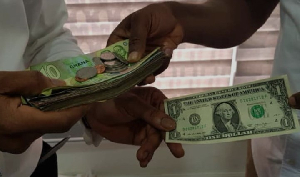The mere sight of some of our currency notes alone has been reason enough to cause countless brawls between many people as no one wants grimy or dirty looking money in their possession especially as change for money that was quite decent in appearance. If nobody wants to receive dirty money, why then do we carelessly handle our currency?
Many Ghanaians do not like using wallets or purses, and our currency is mostly tossed in handbags or schoolbags, or crumpled and shoved deep down a child’s pocket. Others prefer to tie them in their waist cloths, or even when they do use wallets, just squeeze them in there without particularly taking time to arrange them in.
The treatment given to our cedi notes by most people is very disconcerting; some cedi notes are so defaced that most people reject them immediately when given as change, and they cannot exactly be blamed for refusing them. Some of our currency notes, besides being very dirty and showing signs of wear and tear can be seen spotting very icky stains such as bits of fish, food and oil, and also bearing markings such as scribbles and even telephone numbers.
Besides the physical defacement that the currency goes through, there is the other unsettling but seeming unavoidable danger that the currency handlers are exposed to. Individuals from almost every socio-economic background routinely hold and transfer paper currency, and any object that can spread communicable diseases throughout a diverse population must be considered a risk to public health. This is particularly disconcerting now that the fear of Ebola contraction is hanging over us like a dark cloud.
Most individuals especially the local traders count the paper notes using saliva. Apart from this, improper hand washing after using the toilet, coughing and sneezing on hands then exchanging money and placement of the currency in unhygienic environments leads to contamination. These contaminated notes subsequently act as a vehicle delivering bacteria to the hands of the next user.
Dirty and defaced currency often projects money that has gone through the worst form of contamination, which is why most people reject them.
“It looks like money that has been passed down right from the hands of a mad mine to mine…” a giggling teenager told SCANDAL when she was interviewed concerning this issue.
Mrs. Katherine Antwi, a nursery teacher also said she does not accept worn out currency notes. “Especially when the money I gave out was in very good shape…” She said.
A driver’s mate who gave his name as Kwesi Ansah said this problem is one of his greatest challenges in his line of duty. “People give you the worn out monies as payment but when you give them their change with dirty money; they vehemently refuse to accept it. Meanwhile there is no other money sometimes to change them with except the worn out ones. It is very frustrating!” he said. “Because we need their services, it is very difficult for us to turn down the money they give us no matter the state in which it is…” Kwesi added.
In a survey conducted in England, researchers found that people are driven to spend old or dirty money faster than the new and crisp notes. The report indicated that dirty money stimulates impulse buying since people dislike the thought of dirty or contaminated money in their possession and would like to spend it just to get rid of it. In an experiment, subjects given a worn-out 10 dollar bill were more likely than those given a new, crisp 10 dollar bill to participate in a gambling exercise where they could either lose their money or win more, even though the odds of losing the money were the same.
Miss Sedinam Kekeshie, a tertiary student confirmed that this held some truth during her interview with SCANDAL concerning the issue. “When paying for services when I’m out, I always select the worn out monies in my purse first to make the payments with” she said. “I absolutely hate to see grimy money in my purse and always make sure I use them somehow…” Miss Kekeshie added.
Besides the huge cost that government bears to wipe out defaced currencies from the system, every Ghanaian must know that what goes around comes around, and in the case of money, this is especially true. When we do not handle our money very well, it will definitely end up back in our own pockets and wallets. This is why every Ghanaian must make a conscious effort to maintain our currency. Money is the most widely used and sought after thing on the planet, and has been the model of economic exchange since 1000 AD. IT is very important that we take utmost care of it. Countries such as Malaysia and China have modern notes which are made from a special blend of cotton and linen, and coated with animal gelatin. This gives them a plastic- like feel which cannot be pulled apart. It also makes it easy to wipe off and even clean the money with a wet fabric.
Although the primary purpose for the development of these plastic currency notes was to enhance security, it has been proven that it has many more advantages since it does not absorb water, saliva or sweat, and has a relatively low bacterial count compared with our cotton-based paper notes. It would certainly be of tremendous benefit to Ghanaians if our government could adopt this form for our own cedi notes.
Opinions of Wednesday, 17 December 2014
Columnist: Scandal Newspaper



















